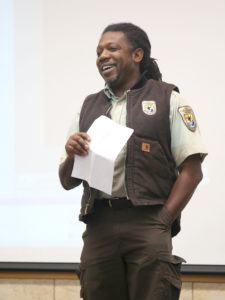 Lamar Gore is a 21CSC Champion of the Year for 2017.
Lamar Gore is a 21CSC Champion of the Year for 2017.
Lamar Gore
U.S. Fish & Wildlife Service (USFWS) – John Heinz National Wildlife Refuge
As the John Heinz National Wildlife Refuge Manager, Lamar Gore strives to work with partners, the community, and schools to meet both refuge and community goals in Philadelphia, PA. He began his career with the U.S. Fish and Wildlife Service (USFWS) as a biological technician at the Montpelier Office of Fishery Assistance, later working with several National Wildlife Refuges, other USFWS programs, and the Northeast Regional Office. At John Heinz, Gore helped develop environmental education programs at three local schools. Additionally, working with Audubon Pennsylvania and the Student Conservation Association (SCA), Gore has developed relationships with the public to create green space (habitat, gardens, learning spaces, etc.) in Philadelphia neighborhoods. He has also worked in partnership with the Clean Air Council, the city and others to improve multi-use trail connections from John Heinz to the community. Gore is an advocate for SCA programs, and has attained support to get more youth involved in local projects. He has a vision to make seamless connections between John Heinz and the surrounding community. The result of Gore’s work has generated new funding to create a youth community restoration program, putting youth to work on conservation projects during the school year.
Q&A with Lamar Gore
Tell us a little bit about your background. How did you get started in conservation and preservation?
Since childhood, I’ve had an interest/fear in the natural world, which sounds odd. There was the desire to discover, but fear to touch. I had some key areas that sparked me including an uncle who was a fisherman and a 7th grade science teacher who introduced me to fly fishing. A trip he took our class to, in which we stayed in cabins for a week in Stokes State Forest was the trip that lit the torch for me. As a Freshman in college, I stumbled onto the USFWS with a program called the Career Awareness Institute, based in Tennessee, and it was this program that launched me into the fisheries program as a Cooperative education program student. The opportunities and challenges were rewarding along the way, and I wouldn’t change a bit of it.
What advice would you offer to resource management agency units and nonprofits interested in partnering with 21CSC programs?
I look at this partnership as an opportunity to give back to our target communities. You can engage youth in conservation careers and teach important work skills to those youth. It’s difficult to understand the full value of this type of programming until you realize even one of those youth sinking their teeth into a career in the conservation field and becoming a leader.
What should one expect when partnering with a 21CSC program?
Expectations range from a member network that can recruit and manage the administrative function of interns assigned to your site. The ability to recruit in target communities, and vetted candidates.
Where can those interested in working with the 21CSC turn for resources?
There is a lot of knowledge and experience in partners who have worked with Corps Network member organizations, so talking with us can shed a great deal of light on the benefits, however, you can also visit the networks webpage to fill in the gaps.
What advice do you offer to young people in 21CSC programs who are interested in careers in preservation and land/water management?
I would first say that as you enter the program, empty your cup and let your supervisors and mentors refill it. They will prepare you for a road to success. Second, make your first, middle, and last impression count with those you work with and for. Those impressions can and often do follow you around. Be sure to network with the agencies you work for and do not be afraid to try things outside your comfort zone, as it’s in those places that you will be sure to grow and learn.
What drives you to support the 21CSC and youth engagement on public lands?
For me being a part of youth engagement on public lands is about land stewardship. The conservation world has been fighting a losing battle for years, because we have not put enough emphasis on both youth and community engagement on and off public lands, making a connection between each. The ambassadors developed by engaging people on and off public lands are invaluable to the youth, the community, and the public agency.
What do you see as the future of Service and Conservation Corps?
I expect to see service and partnerships increasing, but the work of communicating through our youth will be of the utmost importance. Youth communicating with you and community communicating with community are often more effective than “Joe Blow conservation” communicating with youth or community. That doesn’t mean it doesn’t work, but I believe we need a stronger impact.
